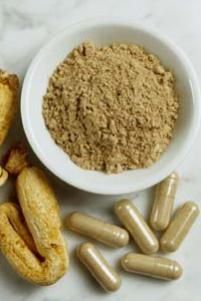Whether you are suffering from heartburn or just a simple upset stomach, the following herbs may give you the relief you seek.
German Chamomile (Matricaria chamomilla or Matricaria recutita)
German Chamomile (Matricaria chamomilla or Matricaria recutita)
Just the name brings to mind soothing images. Chamomile tea has long been used to promote relaxation, to aid sleep, and to settle an upset stomach. In Germany, chamomile is considered a cure-all and is used to treat mild skin irritation and intestinal cramps and to soothe frazzled nerves.
In Europe it is added to mouthwashes to treat mouth and throat irritations, to inhalants to treat respiratory infections, and to ointments to treat hemorrhoids and skin conditions. In Germany alone there are more than 90 licensed preparations of chamomile. German chamomile contains several compounds that are known to soothe the digestive tract and help fight minor infections, but there are few human studies that have carefully evaluated its effectiveness.
However, German chamomile has been well-studied in animals and has been proved effective. And it has a good safety record, especially considering its widespread use. Chamomile is currently being studied for its antioxidant properties, and it contains the phytochemical coumarin, which is believed to have antispasmodic and antiseptic properties.
It is most often used as a freshly prepared tea, drunk three to four times a day to relieve gastrointestinal upset. However, if you're allergic to ragweed, you could have an allergic reaction to chamomile as well, so be cautious. Herbal experts warn that because chamomile is not cheap, many foreign manufacturers of chamomile oil have, in the past, resorted to adding synthetic, blue-colored compounds to make the valuable herb go farther.
Flax (Linum usitatissimum)
This blue-flowered plant produces dark, flat seeds that are slightly larger than sesame seeds. Flax was grown as a crop as far back as 3,000 b.c., and in 650 b.c. Hippocrates used flaxseed for the relief of intestinal discomfort. It was considered so important for the health of his subjects that in the eighth century, King Charlemagne passed laws and regulations governing its consumption.
Flaxseeds are rich in protein, dietary fiber, and healthy omega-3 fats. In fact, flaxseed oil is one of the richest known sources of the omega-3 fat alpha-linolenic acid, an essential fatty acid that makes up 55 percent of the oil flaxseed contains. Alpha-linolenic acid provides flax with its anti-inflammatory effect and its ability to boost the immune system, and it may play a role in the treatment of autoimmune diseases.
Omega-3s are believed to help fight arthritis, heart disease, and possibly stroke. Flaxseeds are also rich in soluble fiber (the kind that lowers cholesterol), and they help regulate blood sugar and promote regularity. Flax is also one of the best sources of lignans, a naturally occurring plant compound that has hormonelike effects in the body.
Both the omega-3 fats and the lignans in flaxseed may help prevent or reduce the risk of some kinds of cancer, such as cancer of the breast, prostate, colon, and uterus. To get the full benefit of flaxseeds, grind them in a coffee grinder before adding them to bread or to pancake or muffin batters.
Flax oil -- which contains the omega-3s but not the lignans, which are processed out -- can be taken as a supplement or used in salads, but it is not suited for use in sauteing or frying. Keep both whole flaxseeds and flax oil refrigerated for no more than one year, since their high polyunsaturated fat content makes them vulnerable to rancidity. You can also find a few varieties of breads and cereals that contain flaxseed.
Ginger (Zingiber officinale)
The uses of this herb have expanded beyond the kitchen spice rack to the medicine cabinet. It has a long tradition as a digestive aid, perhaps because it increases the secretion of digestive juices in the stomach, and its use has been documented in ancient Greek, Roman, and Arabic medical literature. Now there is considerable evidence for ginger's effectiveness as an antinausea treatment.
In fact, ginger has been found to be even more effective for the treatment of nausea from motion sickness than dimenhydrinate, the most commonly used over-the-counter medication for the condition. Ginger has even been tested at sea and found to work well against sea sickness. In addition to motion sickness, it may also be helpful in treating nausea due to other causes.
For instance, ginger has been found effective in reducing the nausea many people experience following surgery. And because ginger acts locally on the digestive system, it has advantages over dimenhydrinate, which acts on the central nervous system to suppress nausea. However, ginger use may not be recommended for people undergoing chemotherapy if their platelet counts have dropped too low.
That's because ginger also has blood-thinning properties, and the two combined could, theoretically, increase the risk for internal bleeding. On its own, ginger appears to be quite safe and has no serious side effects. The usual dose is 150 milligrams (mg) to 1 gram of powdered root in capsule form several times a day.
Another tastier way to get ginger is through candied or crystallized ginger, usually available at gourmet or Asian markets. A one-inch square is equivalent to about one 500-mg capsule. You can also make ginger infusions, or tea, from grated or sliced ginger root; it is difficult, however, to know exactly what dose of ginger you are getting.
Milk Thistle (Silybum mariamum)
Milk Thistle (Silybum mariamum)
In animal studies, silymarin -- the active ingredient in milk thistle -- protects liver cells against a variety of liver toxins, including drugs, viruses, and radiation. In fact, in Europe an extract prepared from milk thistle fruit is used to fight liver disease caused by alcoholism, toxic chemicals, and poisonous mushrooms.
Silymarin also acts as an antioxidant, scavenging free radicals, blocking toxin entry into cells, inhibiting inflammation, and stimulating liver regeneration. The German Commission E endorses the use of milk thistle as a supportive treatment for chronic inflammatory liver conditions and cirrhosis.
No adverse effects have been reported. However, if you have diabetes, talk with your doctor about carefully monitoring your blood glucose while you're taking it. The typical dose is a 140-milligram capsule, standardized to 70 percent silymarin, two to three times a day.
Psyllium (Plantago psyllium)
Known for its soluble-fiber content, it's actually the dried husk of psyllium seeds (also known as plantago seeds) that you'll find in products that contain psyllium. Psyllium-based supplements may be your best bet for a supplemental source of soluble fiber.
Not only is psyllium proven to lower blood cholesterol, it also serves as an effective laxative and is readily available as an over-the-counter drug. Psyllium is also found in some breakfast cereals. The Food and Drug Administration recently approved the use of a health claim on psyllium-containing cereals, stating that "The soluble fiber from psyllium seed husk in this product, as part of a diet low in saturated fat and cholesterol, may reduce the risk of heart disease."
Each product must contain at least 1.7 grams of soluble fiber from psyllium per serving. Be sure to drink plenty of fluids when you eat psyllium cereals, or it could possibly cause a gastrointestinal blockage.
Saw palmetto (Serenoa repens)
The fruit of the saw palmetto plant could spell relief for many men suffering from benign prostatic hyperplasia, or BPH, a slow, progressive enlargement of the prostate gland. It was actually a commonly used drug in the United States during the first half of the twentieth century, but faded out of sight after World War II.
Most clinical trials clearly show the ability of saw palmetto extract to improve the signs and symptoms of BPH. In fact, in Europe it is considered the first line of treatment for the condition. It has even been compared with a prescription drug commonly used to treat BPH and was found to be just as effective, but with fewer side effects.
Saw palmetto acts as an anti-inflammatory as well as an anti-androgenic therapy -- it inhibits the action of male hormones such as testosterone. It does not, however, reduce the size of the prostate or improve sexual function. The usual dose is 160 milligrams twice a day of an extract standardized to contain 85 to 95 percent fatty acids and sterols.
Because the active ingredients are fat soluble, a tea prepared from the herb has little therapeutic value. Several clinical trials using saw palmetto in combination with other herbs, such as nettle root and pumpkin seed extract, were also positive. Saw palmetto causes few side effects.
The German Commission E lists stomach upset as the only side effect. It offers an alternative for the treatment of mild to moderate BPH when conventional treatments are not an option.
Continue to the next, and final page of this article to learn about several mental botanicals for seniors, along with pros and cons for each.


